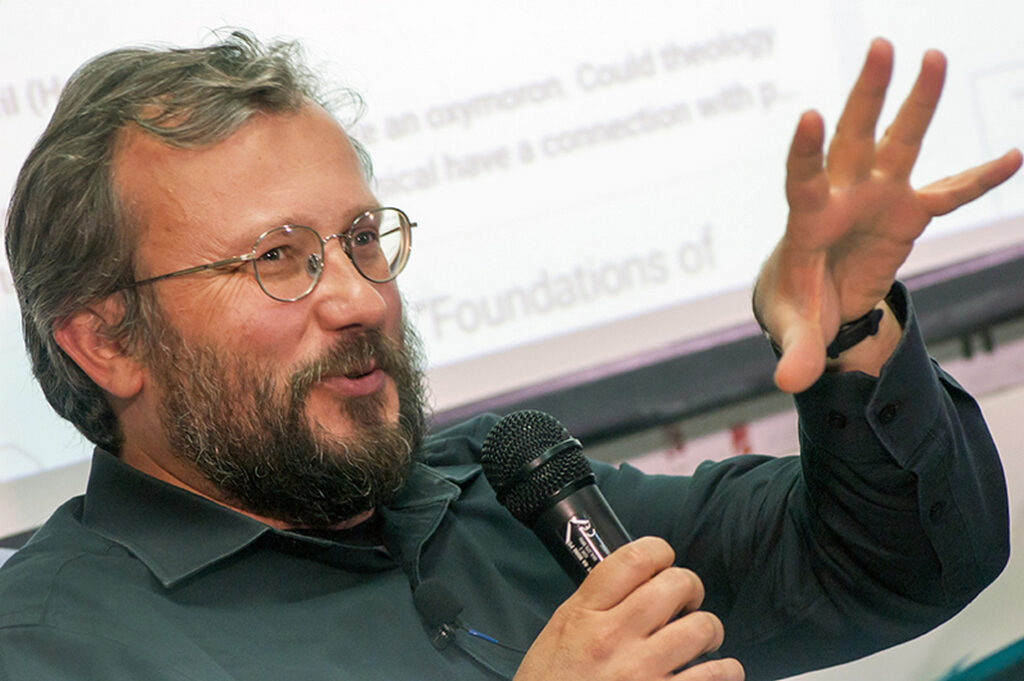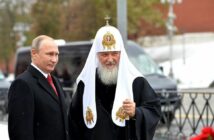Source: Peter Anderson, Seattle USA
On December 29, 2023, Patriarch Kirill issued the following decree relating to Archimandrite Cyril Hovorun: “Hereby, on the basis of the decision of the diocesan church court of the Moscow diocese dated October 31, 2023, you are deposed from the priesthood in connection with violation of the 25th rule of the Holy Apostles.” http://moseparh.ru/ukaz-u-02216-ot-29-dekabrya-2023.html (first posted on Jan. 17, 2024) On October 31, 2023, the Moscow diocesan court had ruled: “Recognize that, on the basis of the 25th Rule of the Holy Apostles, Archimandrite Kirill (Govorun) is subject to canonical reprimand in the form of demotion from the priesthood.” http://moseparh.ru/reshenie-eparxialnogo-cerkovnogo-suda-moskovskoj-gorodskoj-eparxii-po-delu-zapreshhennogo-klirika-arximandrita-kirilla-govoruna.html On September 25, 2023, Patriarch Kirill had issued a decree suspending Archimandrite Cyril. http://moseparh.ru/ukaz-u-02152-ot-25-sentyabrya-2023.html It provided as follows:
“The written commitment of fidelity to the Russian Orthodox Church given by you was repeatedly violated, which was expressed, among other things, in your concelebration with the bishops and clergy of the Church of Constantinople, with which Eucharistic communion was interrupted by the decision of the Holy Synod due to a gross invasion of the canonical territory of the Ukrainian Orthodox Church. In this regard, you, as having violated the priestly oath given by you, in accordance with the 25th rule of the Holy Apostles, are hereby prohibited from serving in the priesthood without the right to wear a cassock and a priestly cross and give a priestly blessing during the consideration of your case in the diocesan court of the Moscow diocese.”
On January 13, 2024, the Moscow diocesan court issued a decision relating to Archpriest Alexei Uminsky. http://moseparh.ru/cerkovnyj-sud-g-moskvy-prinyal-reshenie-po-delu-prot-aleksiya-uminskogo.html This decision provides in relevant part as follows:
“At the meeting in accordance with Art. 45, paragraph 3 of the Regulations on the Church Court of the Russian Orthodox Church, it is recognized that, on the basis of the 25th Rule of the Holy Apostles, Archpriest Alexei Uminsky is subject to expulsion from the priesthood for violating the priestly oath (oath-breaking) – refusal to fulfill the Patriarchal blessing to read the Prayer for Holy Rus’ in the Divine Liturgy. According to the regulations, the decision is sent for approval to His Holiness Patriarch Kirill of Moscow and All Rus’.”
Both Archimandrite Cyril and Archpriest Alexei Uminsky are well-known personalities, and both are opposed to Russia’s invasion of Ukraine. I have described their backgrounds in prior newsletters. https://www.unifr.ch/orthodoxia/de/dokumentation/anderson/ (Uminsky – 13 Jan. 2024; Hovorun – 2 Oct. 2023). Both were found guilty of violating their priestly oath for not following the instructions of the Patriarch or the Holy Synod. There was a long time period between their taking of the priestly oath and the alleged violations of the oath. Uminsky was ordained in 1990 – over 30 years before the alleged violation. Hovorun was ordained in approximately 2002 – over 20 years before the alleged violation. The following is the text of the priestly oath used in Moscow in 2006: https://ustav.livejournal.com/3462.html The canonical basis for defrocking both priests was the 25th canon of the Holy Apostles.
The 25th canon provides in relevant part: “If a bishop, presbyter, or deacon be found guilty of fornication, perjury, or theft, let him be deposed….” https://orthochristian.com/158256.html Because the alleged violations did not constitute “fornication” or “theft” and because the alleged violations involve violating the priestly oath, the defrocking must have been based on the findings that Hovorun and Uminsky engaged in “perjury.” As a retired attorney, I know that violation of an oath at a much later date is not “perjury.” Rather, perjury involves stating under oath something that one knows is false. See generally https://en.wikipedia.org/wiki/Perjury If one says under oath he will “ try in every possible way to carry out the service [of a priest]in everything consistent with the word of God, with the rules of the church and the instructions of the hierarchy” and then decades later fails to follow the instructions of a hierarch, he is not guilty of perjury.
An important question is how the 25th canon is stated in the original Greek. What is the word in Ancient Greek which is translated into English as “perjury”? The word is “ἐπιορκία.” The translation of this word into English is “1. false swearing 2. perjury.” https://en.wiktionary.org/wiki/%E1%BC%90%CF%80%CE%B9%CE%BF%CF%81%CE%BA%CE%AF%CE%B1 See also https://morphological_el.en-academic.com/781950/%E1%BC%90%CF%80%CE%B9%CE%BF%CF%81%CE%BA%E1%BD%B7%CE%B1; https://vocab.perseus.org/lemma/32660/?filter=urn:cts:greekLit:tlg2048.tlg001.1st1K-grc1 Again, this shows that the Greek word means saying under oath something that is not true. It is also logical that those who originally wrote canon 25 did not intend the canon to apply to situations such as those involving Hovorun and Uminsky. It would mean that a church could make any conduct subject to defrocking simply by prohibiting the conduct in the priestly oath. In this regard it should also be remembered a person becoming a priest does not have the right to negotiate the terms of the priestly oath. If one does not sign the printed oath presented to him, one is not ordained. The priestly oath apparently used in Moscow required that the signer act consistently with the instructions of the hierarchy. If canon 25 is applied to situations where a priest does not follow an instruction of a bishop as required by the priestly oath, it would mean that a bishop could make any conduct subject to defrocking simply by prohibiting it. In drafting canon 25, the bishops specified only three offenses. Two of the offenses, “fornication” and “theft,” are very specific serious offenses. I believe that it is very doubtful that the drafting bishops intended the third offense listed in canon 25, namely “perjury,” to be so flexible as to allow a subsequent bishop to make any conduct subject to defrocking simply by the subsequent bishop prohibiting it. I am not an expert in canon law or ancient Greek. However, I have practiced law for over forty years, and I believe that the application of canon 25 to Hovorun and Uminsky raises some genuine doubts as to whether canon 25 was properly applied to these cases.
In other news, a priest has been appointed by the Ecumenical Patriarchate to be the exarch of its newly formed Orthodox Church in Lithuania. The priest is an Estonian, Father Justinus Kiviloo. On January 6, he held his first public liturgy in Lithuania as exarch. Kiviloo was born of a Lutheran family in 1962 in northwestern Estonia. He converted to Orthodoxy when he was a young adult. For over 20 years, he served as the deacon for Metropolitan Stephanos of Tallinn and All Estonia (Ecumenical Patriarchate). In 2013 he was ordained a priest and subsequently served in two different Estonian towns. Kiviloo has given a long interview at https://novayagazeta.ee/articles/2024/01/15/vselenskii-patriarkhat-dal-liudiam-v-litve-vozmozhnost-molitsia-po-sovesti-interviu-konstantinopolskogo-pravoslavnogo-ekzarkha-iustinusa-kiviloo He stated that last summer Metropolitan Stephanos had recommended him to Ecumenical Patriarch Bartholomew as the exarch for Lithuania. This is because Kiviloo had worked closely with Stephanos in creating the structure of the Ecumenical Patriarchate’s church in Estonia. In the interview, Kiviloo made the following interesting statement: “There were even statements from some Lithuanian politicians that the property of the church, where the Moscow Patriarchate now holds its services, should be taken away. I was also asked for my opinion – I am categorically against it. We need to build our own churches and serve there.” The new exarchate will include ten clergymen and ten communities in different towns across Lithuania. https://www.lrt.lt/en/news-in-english/19/2162671/constantinople-patriarchate-sets-up-church-structure-in-lithuania In comparison, the Moscow Patriarchate’s church in Lithuania presently consists of “2 monasteries and 50 parishes, in which 62 clergy serve, including 53 priests and 9 deacons.” https://www.orthodoxy.lt/novosti/4479-sostoyalos-ezhegodnoe-vseobshee-sobranie-litovskoi-pravoslavnoi-cerkvi Interestingly, nine clerics of the Ecumenical Patriarchate’s church in Lithuania have received awards from the U.S. State Department for their roles in promoting religious freedom in Lithuania. https://www.state.gov/international-religious-freedom-awards/?fbclid=IwAR1pcPNCW0BDUkM7M2EkLYEShETjDzx2buHxrit4cajCr2q61n30XZeYfQU
In Estonia, it was reported on January 11, 2024, that Metropolitan Evgeniy (Reshetnikov) of Tallinn and All Estonia (Moscow Patriarchate) must leave Estonia by February 6 when his temporary residency permit expires. https://ria.ru/20240118/estoniya-1922068636.html Metropolitan Evgeniy is Russian and has been in Estonia since 2018. The head of the north prefecture of the Estonian Border Guards issued the following statement: “Representatives of the Ministry of the Interior have repeatedly met with Reshetnikov to explain to him that he needs to stop vindicating the Kremlin regime and Russia’s military actions in his statements. But despite past warnings, Reshetnikov has not altered his conduct, which is found to be incompatible with Estonia’s values and legal environment. That is why Reshetnikov’s actions pose a threat to security.” The Estonian Orthodox Church of the Moscow Patriarchate has responded to this action as follows: “Today, an official letter was received from the Police and Border Guard Department regarding the decision not to renew the temporary residence permit of Metropolitan Evgeniy of Tallinn and All Estonia. We are not giving any comments now, but we ask all the faithful children of our Estonian Orthodox Church to strengthen their prayers both for our Primate, Metropolitan Evgeniy, and for our Church.” https://ru.orthodox.ee/news/palume-tugevdada-palveid-prosim-sugubyh-molitv/
In Bulgaria on January 6, Patriarch Neophyte “sprinkled the warriors and battle flags of the Bulgarian Army with consecrated Epiphany water.” https://bg-patriarshia.bg/news/patriarshesko-blagoslovenie-za-velikia-bogoyavlenski-vodosve In his address, he stated: “The destructive war against brotherly Ukraine, followed by the no less terrifying for our Christian conscience military clash in the lands sanctified by the God-man presence of the Savior, once again reminded us all of the importance of the army for every nation and state.” It has been pointed out on the Internet that Patriarch Kirill subsequently addressed a letter of condolence upon the death of Bulgarian Metropolitan Ioannikis of Sliven to the “Holy Synod of the Bulgarian Orthodox Church” and made no mention at all to Patriarch Neophyte. This stands in sharp contrast to the normal practice of addressing such a letter of condolence to the patriarch under whom the deceased bishop served. See, for example, https://mospat.ru/ru/news/90351/ (Patriarch Kirill addresses his letter of condolence to Patriarch Theophilos upon the death of Metropolitan Cornelius of Petra.) It has been speculated on the Internet that this failure to address Patriarch Neophyte was due to his prior reference to the “destructive war against brotherly Ukraine.”
Metropolitan Anthony, head of the Moscow Patriarchate’s DECR, took part in Moscow in the presentation of the Russian-language edition of Pope Benedict XVI’s book, Jesus of Nazareth. https://mospat.ru/ru/news/91257/ Metropolitan Anthony also wrote one of the prefaces to the Russian-language edition. Metropolitan Anthony had high praise for Pope Benedict. For example, the Metropolitan stated: “However, opening it [Benedict’s book], it is impossible not to be amazed by the colossal erudition of Joseph Ratzinger, who shows in the full sense a ‘universal’ example of mastery of all the riches of traditional Christian exegesis and at the same time an excellent orientation in the problems of modern philosophical hermeneutics, textual criticism and biblical studies in general.” At the Moscow presentation, Metropolitan Anthony also commented on his many personal communications with Pope Benedict. The Metropolitan stated: “I remember the last such meeting very well: we stood at the window, from which there was a beautiful view of the [Russian Orthodox] Church of St. Catherine, where I then served, and the Pope told me that he begins and ends every day by looking at the Russian church.” https://ria.ru/20240118/mitropolit-1922039747.html
Peter Anderson, Seattle USA




